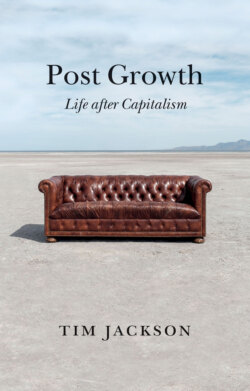Читать книгу Post Growth - Tim Jackson - Страница 9
1 The Myth of Growth
Оглавление‘We are in the beginning of a mass extinction. And all you can talk about is money and fairytales of eternal economic growth.’
Greta Thunberg, September 20191
‘Too much and for too long, we seem to have surrendered personal excellence and community values in the mere accumulation of material things.’
Robert F. Kennedy, March 19682
St Patrick’s Day, 17 March 1968. It was an unseasonably mild Sunday evening. The night air held the promise of an early spring as Senator Robert F. Kennedy arrived in Kansas from New York. He had just that day declared his candidacy for the 1968 Presidential race. To run, he would have to stand against the incumbent President, Lyndon B. Johnson. Senator against President; Democrat against Democrat: it looked like a tough fight ahead and Kennedy was by no means convinced of success.3
But as he stepped down onto the Kansas City tarmac, he and his wife Ethel were besieged by a couple of thousand supporters who broke a police cordon and charged across the runway, shouting ‘Go Bobby Go!’ and demanding a speech. Nothing had been arranged and there was no loudhailer. So Kennedy sportingly threw a few remarks into the wind, before realizing he was barely audible. ‘That was my very first campaign speech,’ he said. ‘Now let’s all clap.’ He clapped his hands, the audience clapped theirs, and everyone laughed. It seemed like an auspicious start to a Presidential campaign.
The Senator was still noticeably nervous the next morning when he arrived at Kansas State University (KSU) for the first formal speech of the campaign. It had been scripted carefully for the occasion by his speechwriter, Adam Walinsky. First impressions matter. None of the campaign team could predict its impact. Kansas was one of the most conservative states in the country, loyal to the establishment and the American flag. It was perhaps the last place that could be expected to show sympathy for Bobby Kennedy’s anti-war message.
He opened, cleverly, with a quote from William Allen White, the former editor of a Kansas newspaper. ‘If our colleges and universities do not breed [students] who riot, who rebel, who attack life with all the youthful vision and vigor, then there is something wrong with our colleges,’ he said. ‘The more riots that come out of our college campuses, the better the world for tomorrow.’ It was a candid appeal to the generation who had brought the anti-Vietnam protest movement out of the ghettos and onto the campuses of liberal, middle-class universities across America. The students loved it. Kennedy’s opening salvo was met with a ‘happy roar’.4
The excitement was palpable. The students in the hall – some of them perched on the rafters – cheered wildly at his all-out attack on the Vietnam war, his disdain for the Johnson administration and his outrage at the base morality of contemporary US policies at home and overseas. This was no cautious opening foray in a careful Presidential campaign. It was dynamite. The reception was better than anyone had dared to hope for. Eyewitnesses describe how one journalist, the Look Magazine photographer Stanley Tettrick, found himself hemmed in by a crowd of students, trying to stay upright in the pandemonium, while shouting to no one in particular: ‘This is Kansas, fucking Kansas! He’s going all the way!’5
Bobby Kennedy was not, as history would have it, ‘going all the way’. But no one knew this, on the opening day of that fateful Presidential campaign. The team were ecstatic. The campaign was launched. The journalists had their story; and the media coverage would do their candidate no harm whatsoever. There was a palpable sense of relief as the entourage made their way to the second speech of the day at KSU’s great sporting rival, the University of Kansas.
Walinsky spent the short journey re-drafting the speech he’d prepared for the second event. It had been intended as a calmer and more considered lecture, showing a more reflective, intellectual side to the Senator. It contained one segment of particular interest here concerning the uses and abuses of the Gross Domestic Product (GDP) – the indicator used to measure economic growth. It was an odd, slightly arcane topic for a campaign speech. A testament to the radicalism of Kennedy’s political vision. It almost didn’t survive the rewrite.
Surprised and delighted by the rapturous response to his morning speech, Kennedy wanted more of the same for the afternoon. So he instructed his speechwriter to ditch the sober content and give the talk a bit of the morning’s edge. What emerged was something that might affectionately be called a ‘mash-up’: sections from earlier speeches woven together with anecdotes and the occasional well-timed joke. By chance the section on the GDP remained. And that simple quirk of fate would turn out to have enormous relevance to this book – and indeed to the life of its author, who was no more than a kid when it all happened.6
